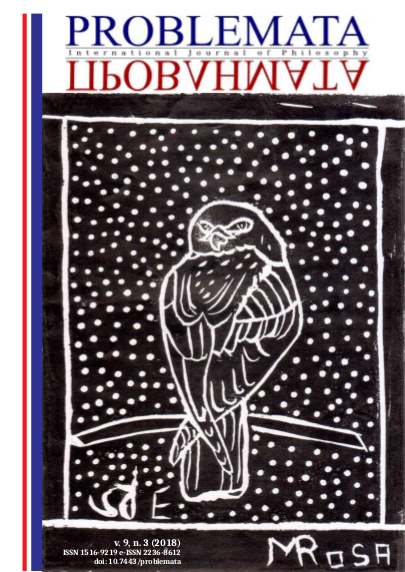HUMANITIES AND PHILOSOPHY IN BASIC EDUCATION
DOI:
https://doi.org/10.7443/problemata.v9i3.41665Keywords:
philosophy teaching, humanities, democracy.Abstract
Faced with the broad set of questions related to the presence of Philosophy in school curricula, this article proposes the investigation of Martha Nussbaum's arguments in favor of a humanist and democratic education, and the evaluation of its relevance in the current Brazilian context.
Downloads
References
ALVES, Dalton José. A filosofia no ensino médio: ambiguidades e contradições na LDB. Campinas, SP: Autores Associados, 2002.
FÁVERO, Altair Alberto; Ceppas, Filipe; Gontijo, Pedro Ergnaldo; Gallo, Silvio; Kohan, Walter Omar. O ensino de filosofia no Brasil: um mapa das condições atuais. In: CADERNOS CEDES 64: A filosofia e seu ensino. Campinas, vol. 24, n. 64, set/dez 2004, p. 257-280.
NUSSBAUM, M. Sem fins lucrativos. Por que a democracia precisa das humanidades. São Paulo: Martins Fontes, 2015 (1ª edição original: 2010).
PÉCORA, Alcir. Resenha: Por que a democracia precisa das Humanidades. Ensino Superior Unicamp, 2011. Disponível em: https://www.revistaensinosuperior.gr.unicamp.br/livros/por-que-a-democracia-precisa-das-humanidades (acesso: 01/05/2018).
SEN, Amartya. Desenvolvimento como liberdade. São Paulo : Cia das Letras, 2000.
UNESCO. La Philosophie, une Ecole de la Liberté - Enseignement de la philosophie et apprentissage du philosopher: état des lieux et regards pour l'avenir. Paris: UNESCO, 2007. (Tradução para o espanhol por UNESCO, 2011).
Downloads
Published
Issue
Section
License
Authors who publish with this journal agree to the following terms:
- Authors retain copyright and grant the journal right of first publication with the work simultaneously licensed under a Creative Commons Attribution License that allows others to share the work with an acknowledgement of the work's authorship and initial publication in this journal.
- Authors are able to enter into separate, additional contractual arrangements for the non-exclusive distribution of the journal's published version of the work (e.g., post it to an institutional repository or publish it in a book), with an acknowledgement of its initial publication in this journal.
-
- Authors are permitted and encouraged to post their work online (e.g., in institutional repositories or on their website) prior to and during the submission process, as it can lead to productive exchanges, as well as earlier and greater citation of published work (See The Effect of Open Access).





